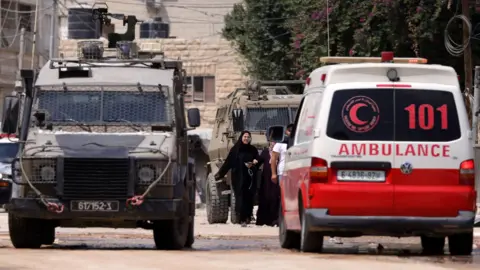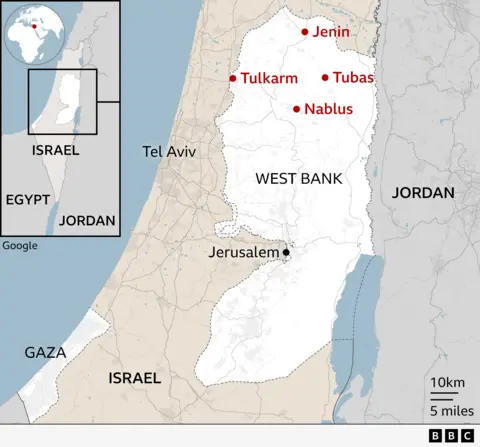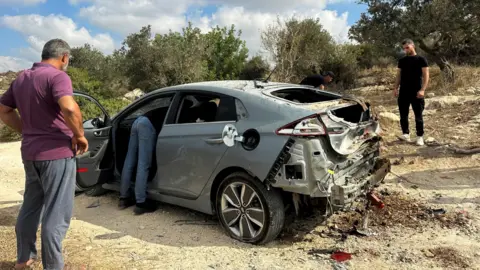 EPA
EPAAt least nine Palestinians have been killed in a major operation by Israeli forces in the north of the occupied West Bank, the Palestinian health ministry says.
Israeli security forces said they had begun “a counterterrorism operation” in Jenin and Tulkarm overnight and that they had so far killed “five armed terrorists from the air and ground”.
It also said another four were killed in an air strike during a simultaneous operation in al-Faraa refuee camp near Tubas.
Local journalists said they had not seen anything of this scope and scale in the West Bank since the days of the second Palestinian intifada, or uprising, two decades ago.
There has been a spike in violence in the West Bank since Hamas’s deadly attack on Israel on 7 October and the ensuing war in Gaza.
Hundreds of Palestinians have been killed as Israeli forces have intensified their raids, saying they are trying to stem deadly Palestinian attacks on Israelis in the West Bank and Israel.
Israeli media reported that hundreds of Israeli forces were active in four different cities at least in the north of the West Bank – Jenin, Tulkarm, Tubas and Nablus.
The Palestinian health ministry in the West Bank said on Wednesday morning the bodies of seven people had been brought to Tubas governmental hospital and that two others had arrived at Jenin governmental hospital.
The Palestinian Red Crescent also reported that at least nine people had been killed across the West Bank, revising down its death toll to 10. It said they included three who were killed in a drone strike in Misilya, a village near Jenin, and four others who were killed in a drone strike in al-Faraa refugee camp, near Tubas.
However, the true figure could be higher, with the governor of Jenin earlier saying that at least 11 people had been killed.
In Jenin – a regular flashpoint – troops blocked all but one of the entrances to the city and set up checkpoints.
The health ministry said Israeli forces had also surrounded Jenin government hospital and the nearby Ibn Sina hospital, as well as the headquarters of the Palestinian Red Crescent and the Friends of the Patients society.
It warned that they were threatening to storm the hospitals and that doing so would threaten the lives of dozens of patients inside as well as medical staff.
“At this moment, there are patients that are leaving the hospital but after the IDF check their IDs,” a local journalist inside the government hospital told the BBC. “It’s a scary situation.”
The health ministry also accused them of obstructing the work of ambulances, which it said was a violation of international law.
The troops have also been searching Jenin refugee camp, which is a base for armed groups and has been the scene of many fierce gun battles in the past.
A resident of the camp told the BBC that he could hear explosions nearby and the buzzing of drones overhead, but that there was currently no sign of armed fighters taking on Israeli forces.
He said Israeli armoured bulldozers had destroyed the main street through the camp and piled rubble at the entrance to block access.
“In the area of Jenin, three armed terrorists who posed a threat to the security forces were eliminated in an aerial strike,” said a joint statement from the Israel Defense Forces (IDF), Shin Bet domestic security agency and Israel Border Police.
“Furthermore, in the areas of Jenin and Tulkarm, the forces eliminated two additional armed terrorists, apprehended wanted suspects, and located and confiscated weapons including M-16s, ammunition, and additional military equipment.”
They also said forces had exposed and dismantled explosives that had been planted under local roads to attack them.
Hamas later put out a statement mourning six men who it said were fighters killed by Israeli forces in Jenin on Wednesday.

During a simultaneous operation in al-Faraa refugee camp, near Tubas, “an aircraft struck and eliminated four armed terrorists that posed a threat to the forces”, while forces on the ground confiscated weapons, they added.
Masoud Naaja said two of his adult sons were killed in the strike, which he said took place as he gave water to some men who had asked for a drink near his home.
“In seconds, very fast, we felt like something came down on us from the sky and there was an explosion,” he told Reuters news agency. “When I put my hand on my chest, it was full of shrapnel and blood.”
“I entered the house to find it all damaged from inside,” he added. “My wife asked me what happened and I told her and asked her to go check on our children on the rooftop. She found three of our children – two, may they rest in peace, and one was injured.”
A woman in Tubas told the BBC that Israeli forces were “bringing more and more military vehicles and bulldozers” into al-Faraa refugee camp.
“We are all on edge and waiting to see if there will be any escalation,” she said.
IDF spokesman Lt Col Nadav Shoshani said the forces were targeting “a mixture of terror groups and terror cells”, and declined to say how long the operation would last or how many troops were involved.
 Reuters
ReutersIsraeli Foreign Minister Israel Katz put out a strongly worded statement saying the military was acting with “full force” in Jenin and Tulkarm, aiming to “dismantle Iranian-Islamic terror infrastructures established there”.
He accused Iran, which backs Hamas and Palestinian Islamic Jihad, of trying to “establish an eastern terror front” by funding and smuggling advanced weapons from Jordan.
Mr Katz said the threat must be addressed with the same determination of the threat from Gaza. including “temporary evacuation of Palestinian residents” – something we have not heard in an official capacity before.
A spokesman for Palestinian Authority President Mahmoud Abbas warned that the escalating Israeli raids in the West Bank, alongside the Gaza war, would “lead to dire and dangerous results for which everyone will pay the price”.
Nabil Abu Rudeineh called for urgent international action to “curb this extremist [Israeli] government that poses a threat to the stability of the region and the entire world”.
Hamas – which is a bitter rival of Mr Abbas’s Fatah movement – condemned the Israeli operation, calling it part of the “brutal genocidal war in Gaza”.
A spokeswoman for the UN Human Rights Office also said such an operation “risks seriously deepening the already catastrophic situation”, and that the use of air strikes and other military weapons and tactics by Israeli security forces “violates human rights norms and standards applicable to law enforcement operations”.
Last Wednesday, the UN said 607 Palestinians – members of armed groups, attackers and civilians – had been killed in the West Bank, including East Jerusalem, since 7 October. At least 589 were killed by Israeli forces and 11 by Israeli settlers, it added.
Fifteen Israelis, including nine security personnel and five settlers, were killed by Palestinians in the West Bank during the same period, while 10 Israelis were killed in Israel in attacks by Palestinians from the West Bank.
Israel has built about 160 settlements housing some 700,000 Jews since it occupied the West Bank in the 1967 Middle East war. The settlements are considered illegal under international law, although Israel disputes this.

